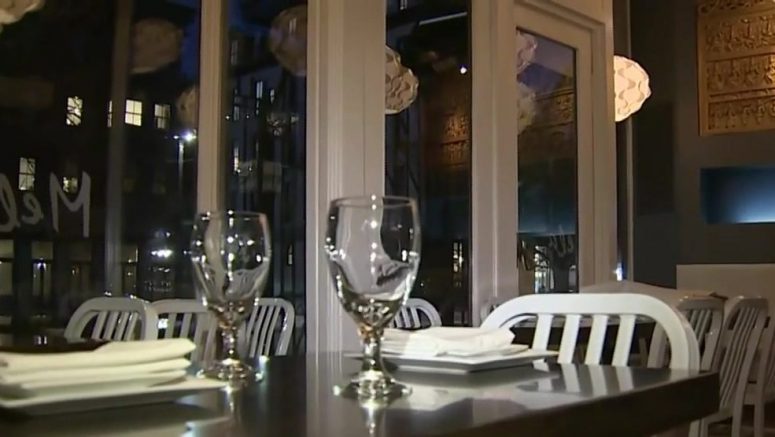CONCORD, N.H. (AP) — New Hampshire restaurants will be allowed to move tables closer together starting Oct. 1 if they install barriers between them, Gov. Chris Sununu said Thursday.
Currently, tables must be placed at least 6 feet apart to reduce the risk of the coronavirus. With the weather getting colder, restaurants have been asking the state to loosen restrictions for indoor dining. Sununu said he rejected requests to allow bars and restaurants to resume the use of dart boards and other games as unsafe, given that they would put players in close proximity to each other. But he believes increasing the number of tables will be ok, with barriers installed.
“We’re very confident we can move forward with this model in a safe manner,” he said.
Earlier Thursday, the chair of the governor’s Economic Reopening Task Force said some restrictions on outdoor dining also will be adjusted in hopes of prolonging that option. Currently, restaurants that serve meals under tents are required to keep all sides open, but the new rules would allow them to drop two or three of the sides to increase warmth. They also would be allowed to use space heaters, pending approval of local fire officials, said D.J. Bettencourt.
The state has not seen outbreaks associated with restaurants, said Beth Daly, chief of the state Bureau of Infectious Disease Control. But based on contact tracing investigations, health officials are concerned that people are letting their guard down when it comes to gathering with friends and family.
“We can’t regulate these settings, backyard barbecues, birthday parties or other types of social gatherings,” she said. “But we want to emphasize that these types of events that occur are potentially high risk for covid-19 transmission.”
In other coronavirus-related developments:
___
HALLOWEEN SAFETY
The state is recommending that trick-or-treaters consider carrying hand sanitizer if they head out to collect Halloween candy.
The Centers for Disease Control and Prevention has deemed traditional trick-or-treating a high risk activity that should be avoided because of the coronavirus pandemic. Gov. Chris Sununu said Thursday communities and individuals should make their own decisions, but the state is offering some tips for those who do participate.
In addition to the suggestion about hand sanitizer, the state recommends trick-or-treaters and those giving out candy wear masks and find ways to stay at least 6 feet away from each other.
“If folks don’t feel safe, if they don’t feel comfortable, they definitely should not partake in either trick-or-treating or providing candy,” Sununu said. “There’s no reason with a little extra precaution we can’t be successful with Halloween.”
The state is following the CDC guidance in telling residents to avoid Halloween parties and large gatherings.
___
SPECIAL EDUCATION
Private schools that serve students with developmental disabilities are getting $4 million from the state’s allotment of federal coronavirus relief aid, Gov. Chris Sununu said Thursday.
Sununu said the funding will help about 20 approved private special education providers that together have 750 students. While public schools rely on them to educate students with some of the most intensive needs, they had not been eligible for previous education programs. The new fund will help fill that gap, he said.
Education Commissioner Frank Edelblut said direct support to special education providers will reduce the burden on local schools and help students most in need of support.
___ THE NUMBERS
As of Thursday, 8,044 people had tested positive for the virus in New Hampshire, an increase of 37 from the previous day. The number of deaths stood at 438.
The seven-day rolling average of daily new cases in New Hampshire has risen over the past two weeks from 28 new cases per day on Sept. 9 to 32 new cases per day on Sept. 23.
For most people, the coronavirus causes mild or moderate symptoms, such as fever and cough that clear up in two to three weeks. For some, especially older adults and people with existing health problems, it can cause more severe illness, including pneumonia or death.

